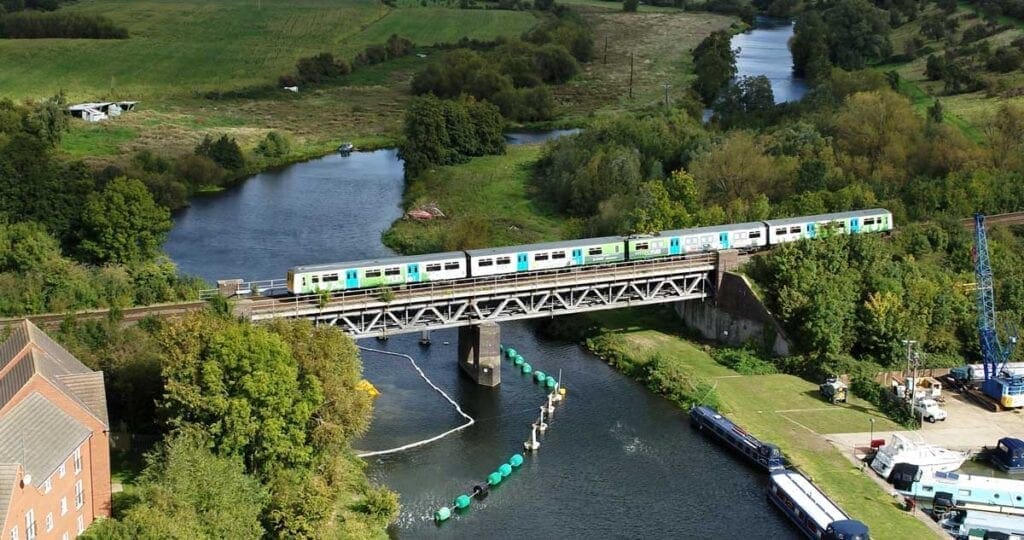
A hydrogen-powered train has travelled on the UK rail network for the first time.
Porterbrook and the University of Birmingham welcomed Transport Secretary Grant Shapps aboard HydroFLEX, the UK’s first hydrogen-powered train, as it started operational trials on the mainline railway.
Today’s trials of HydroFLEX, which have been supported with a £750,000 grant from the Department for Transport, follow almost two years’ development work and more than £1 million of investment by both Porterbrook and the University of Birmingham.
Unlike diesel trains, hydrogen-powered trains do not emit harmful gases, instead using hydrogen and oxygen to produce electricity, water and heat.
A major milestone has been marked for the UK with the first #hydrogen train running on our rail network! ? ? I’m delighted to have ridden the HydroFlex train – another example of our investment in hydrogen tech as part of our ambitious #SustainableTravel and net-zero goals ? pic.twitter.com/O0KqR621XV
— Rt Hon Grant Shapps MP (@grantshapps) September 30, 2020
The Department for Transport said the technology will be available by 2023 to retrofit current in-service trains to hydrogen.
Porterbrook today also announced plans to start putting HydroFLEX into production, in response to customer demand.
Work on the next stage of HydroFLEX is already well advanced with the University of Birmingham developing a hydrogen and battery power module that can be fitted underneath the production version of the train, which will create increased capacity for passengers in the train’s saloon area.
The HydroFLEX train on test today is a demonstrator unit, the production version will be configured for operation using both overhead-electric-wires and hydrogen for non-electrified routes. This will make HydroFLEX particularly attractive to regions and routes where there is only partial electrification of the network.
The Transport Secretary also announced the ambition for Tees Valley to become a Hydrogen Transport Hub. Bringing together representatives from academia, industry and government to drive forward the UK’s plans to embrace the use of hydrogen as an alternative fuel could create hundreds of jobs while seeing the region become a global leader in the green hydrogen sector.
Grant Shapps said: “As we continue on our road to a green recovery, we know that to really harness the power of transport to improve our country – and to set a global gold standard – we must truly embed change.
“That’s why I’m delighted that through our plans to build back better we are embracing the power of hydrogen and the more sustainable, greener forms of transport it will bring.”
The plan for Tees Valley is expected to be published in January 2021 and will pave the way for exploring how green hydrogen could power buses, heavy goods vehicles (HGVs), rail, maritime and aviation transport across the UK.
The next stages of HydroFLEX are well underway, with the University of Birmingham developing a hydrogen and battery powered module that can be fitted underneath the train, which will allow for more space for passengers in the train’s carriage.
Mary Grant, CEO of Porterbrook, said: “Porterbrook is committed to innovation and the delivery of a carbon neutral and sustainable railway. Today’s mainline testing of HydroFLEX achieves another important milestone on this journey. I’m also delighted to be able to announce our intention to start producing HydroFLEX trains, creating the world’s first electric and hydrogen powered bi-mode rolling stock, as well as generating significant opportunities for the UK supply chain.”
Professor Stephen Jarvis, Head of the College of Engineering and Physical Sciences at the University of Birmingham, says: “The University of Birmingham is setting the pace for rail innovation both in the UK and globally. The HydroFLEX project is a great example of how world-class R&D, together with the right industry partnerships, can deliver decarbonisation technologies that are both innovative and practical.
“Successful mainline testing is a major milestone for HydroFLEX and is a clear demonstration of the important role hydrogen has to play in the UK’s rail industry. Through the University and Porterbrook, we are looking forward to delivering this technology into the UK transport market, ensuring a cleaner future for our railways.”


